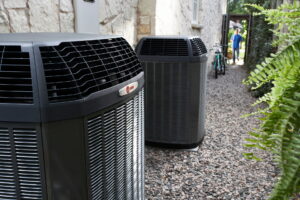As a homeowner, it’s a good idea to be able to identify potential problems with your heat pump so you can stay ahead of a breakdown. When you understand how your heat pump operates and the signs of issues, you can give us a call sooner for heat pump repair in Grosse Pointe, MI when something goes wrong.
You can keep reading to learn more about common heat pump repairs, and the signs of each one. Even if you don’t know what’s wrong with your heat pump, you should always call for service when you notice changes in output or operation. Calling sooner can be the difference between making a minor repair versus a major one later on.
Reversing Valve Issues
The reversing valve is a component that is completely unique to heat pumps. Other HVAC systems do not have reversing valves because heating and cooling happen in completely separate systems. But a heat pump operates as both a heater and an air conditioner.
The reversing valve is what allows the refrigerant to alternate between moving in one direction or the other, depending on your thermostat settings. As your heat pump ages, it’s normal for the reversing valve to wear out or get stuck in one position or the other.
This can prevent your heat pump from switching over when the seasons change. Replacing the reversing valve is usually a pretty straightforward and inexpensive adjustment to make. In some cases, we can even clean and lubricate your reversing valve to get it working again instead of having to replace it.
Frozen Coils Inside or Outside
A heat pump has a set of coils inside and a set of coils outside. It’s possible for either set of coils to develop ice and even freeze over completely if there are operating issues. Heat pumps are more likely to develop ice on the outside condenser coils during the winter season when temperatures are lower.
A heat pump does have a defrosting mechanism to help prevent this from happening, but it’s possible for the mechanism to fail. When this happens, our team needs to thaw out all the coils and also fix the defroster so it can prevent ice from developing again in the future.
Refrigerant Leaks
One of the most common reasons for frozen coils inside is a refrigerant leak, which is also a problem of its own. Refrigerant leaks do not always lead to frozen coils, but there is a correlation between the two. When refrigerant leaks out of the lines, your heat pump doesn’t have enough of a refrigerant charge for heating and cooling.
You may notice that your heat pump system is operating and blowing air, although your home is not as comfortable as you would like it to be. Our team can locate the leak and repair it so that the refrigerant does not continue leaking out. Then we can recharge the refrigerant levels so your heat pump can work adequately again.
Electrical Concerns
We also see a lot of heat pumps with electrical problems. This is more common in heat pumps as they age. Electricity moving through the wires creates heat, and so the wires expand a little during operation. But when electricity stops moving through the lines, and they cool down, they contract and get smaller again.
These changes are so minor that you might not notice them. But over time, the wires expanding and contracting can cause them to loosen in the places where they attach to your home’s electrical panel or the heat pump itself. You may notice changes in how your heat pump operates, like a lack of overall power.
Contact Charter Home Comfort today to schedule an appointment with our professionals for gas furnace service. Old fashioned values with tech savvy results!

